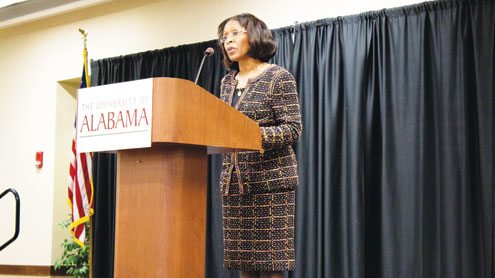For the first time in five years, students and faculty across the UA community met to discuss race relations and diversity on campus with the State of the Black Union Address on Monday.
The address, hosted by the Black Student Union and the UA chapter of the National Association for the Advancement of Colored People, was held as a celebration in honor of Black History Month and black student culture on campus.
After leadership within the two organizations dwindled over the past several years, the traditionally annual State of the Black Union dissolved. However, with a rejuvenated system of leadership, the BSU and NAACP reinstated the address as a promotion of minority leadership and involvement on campus.
“We restored the State of the Black Union Address to campus as a tool to get racial issues in the community out in the open,” BSU president Joshua Gray said. “Hopefully, we created a spark to get people involved.”
Mark Nelson, vice president of student affairs and vice provost, began the event on behalf of Provost Judy Bonner and President Robert Witt. Nelson set the stage with praise to the involvement of black students on campus.
“We are here to celebrate the power of leadership and belonging,” Nelson said. “You all serve as an example for younger students who are still seeking that place of belonging.”
The State of the Black Union Address not only celebrated the involvement of students on campus, but also honored the dramatic change that has occurred at the University of Alabama regarding race relations since 1968, the founding date of the BSU.
As a student at UA from 1965 to 1972, lawyer Booker T. Ford spoke of the increased improvement of diversity on campus. Ford, one of eight students to be admitted into UA’s law school during its first year, explained that the campus was in a time of transition after the Civil Rights Movement.
“I call the treatment of blacks at that time the O.M.I.T. treatment,” Ford said. “We were ostracized, marginalized, isolated and traumatized. No one spoke to you. You had no power.”
Ford was amazed at the progress that the University has made. However, B. Joyce Stallworth, president of the Black Faculty and Staff Association and senior associate dean of English Education, said she believes that students should strive for greater improvement.
“There are no excuses for mediocrity,” she said. “Failure is not an option. There are no short-cuts for excellence.”
DaBrielle Covington, president of the UA chapter of the NAACP, said black students need to set goals for themselves such as creating an impressive resume, receiving an internship and graduating in four years to stay involved on campus and in life. However, she stated the necessity of continued individualism on campus as well.
“We as blacks need to stop conforming,” Covington said. “We came into this world as individuals, and we will leave this world as individuals. We can’t let society change what we believe in.”









